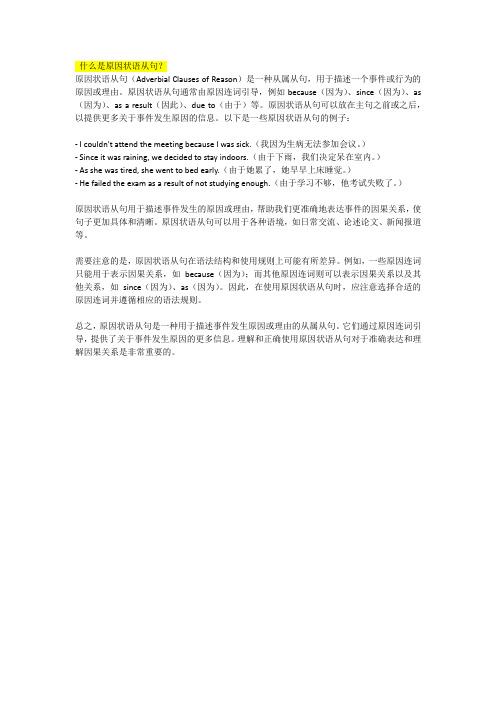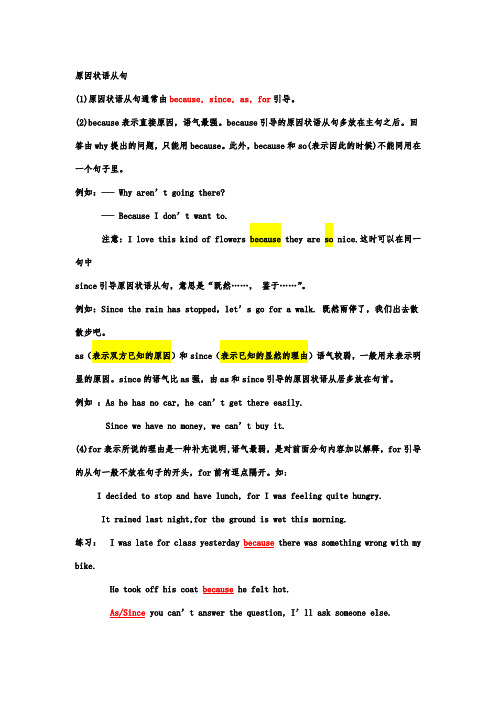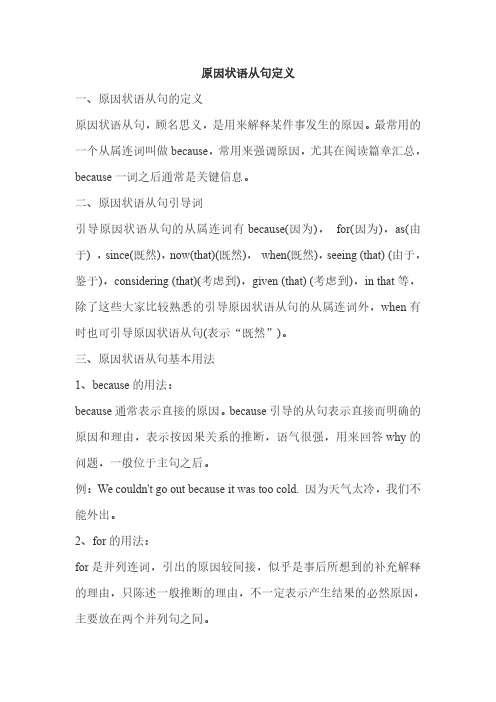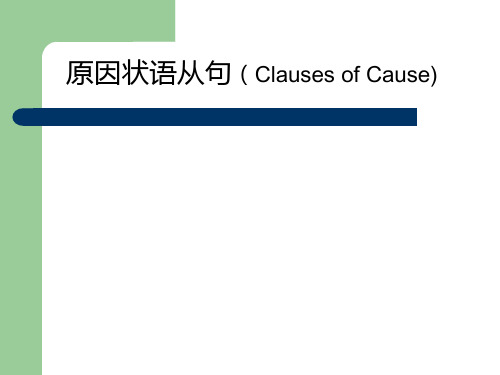原因状语从句
原因状语从句(完整)

原因状语从句(完整)
原因状语从句是一种从句,用来表示某种事件或情况的原因。
它通常由“因为”、“既然”、“由于”、“如果”等引导词开头,以下是一些常用的原因状语从句及其用法:
1.因为(because)
用法:因为引导的原因状语从句可以放在句首或句中,用来解释主句中的原因。
例句:因为他昨晚没睡好,今天一整天都很疲倦。
2.既然(since)
用法:既然引导的原因状语从句表示相信某个前提条件,因此陈述主句中的结果或结论。
例句:既然你已经完成了这项工作,我们就可以开始进行下一步了。
3.由于(due to)
例句:由于天气不好,我们无法进行户外活动。
4.如果(if)
例句:如果你需要帮助,尽管告诉我,我很乐意为你效劳。
5.只要(as long as)
例句:只要你好好学习,你就会成功。
6.尽管(even though)
例句:尽管天气不好,但我们仍然决定继续我们的计划。
7.虽然(although)
用法:虽然引导的原因状语从句表示一个与主句相反的情况,用来表达抱怨、惊讶等情绪。
例句:虽然我跟他说了很多遍,但他还是不肯听我的建议。
8.随着(as/with)
例句:随着科技的进步,我们的生活变得越来越便利。
总之,原因状语从句是一种非常重要的语法结构,它可以表达出各种事件或情况的原因,让句子的意思更加清晰明了。
希望通过以上的例句和用法介绍,能够帮助大家更好地掌握原因状语从句的用法。
原因状语从句

原因状语从句Company number:【WTUT-WT88Y-W8BBGB-BWYTT-19998】二、原因状语从句:1、定义:在句中用来说明主句原因的句子叫原因状语从句。
2、常用引导词: because(因为), as (由于), since (既然), now (that) (既然)3、时态:原因状语从句一般都是根据实际情况选用适当的时态。
通常是主过从过,主现从现。
4、because, since和as的区别:1) because引导的原因状语一般放于主句的后面,because从句位于句首时要用逗号分开,放在句末时,可不用逗号分开。
because表示直接原因,语气最强,最适合回答why引导的。
because of 也表示原因,但它后面不接从句, 只能接名词, 代词或动名词。
注意:because 和so 不可同时出现在一个句子里。
①I do it because I like it. = I like it so I do it.②We went by bus because it was cheaper. = It was cheaper so we went by bus.③ He can’t go to school because of his illness.2) since引导的原因状语一般放于主句之前表示已知的、显然的理由(通常被翻译成“既然”= now that ),较为正式,语气比because弱。
①Since you are free today, you had better help me with my mathematics.②Since you don't trust him, you should not employ him.③Now (that) you are grown up, you should not rely on your parents.3) as引导原因状语时表示附带说明的“双方已知的原因”,含有对比说明的意味,语气比since弱,较为正式,位置较为灵活(常放于主句之前)。
初中英语知识点总结原因状语从句)

初中英语知识点总结原因状语从句)原因状语从句是指用来表示一些动作、状态或事件的原因的从句。
原因状语从句通常以because、since、as等连词引导,它可以放在主句之前或之后。
以下是关于原因状语从句的一些知识点总结:1.连词的选择:- because:指明明确的原因,是最常用的连词。
- since:表示原因时,强调原因和结果之间的逻辑关系。
- as:表示原因时,强调原因和结果之间的同时性或者递进关系。
- for:表示原因时,强调意外或出乎意料的结果。
2.语序:-当主句在前,从句在后时,从句用陈述语序。
-当从句在前,主句在后时,主句用陈述语序。
3.破折号使用:- 当原因状语从句只是补充说明时,可以用破折号将其和主句分隔开来。
例如:He won the game—because he practiced very hard.4.可以省略的情况:- 当原因状语从句的主语与主句的主语一致时,从句的主语和be动词可以省略。
例如:As he was tired, he went to bed early.- 当because引导的原因状语从句放在句首时,可以将主句的主语和be动词省略,而将主句改为倒装句。
例如:Because he was tired, did he go to bed early?5.特殊结构:- not because...but because...:表示原因时,强调两个不同的原因。
- not only...but also...:表示原因时,强调两个不同的原因,同时强调结果的递进关系。
总之,了解原因状语从句的用法和相关的语法规则,能够帮助我们在写作和表达中更准确地表达原因。
英语中原因状语从句

英语中原因状语从句原因状语从句表原因,以下逐一介绍高考中常见的原因状语从句的引导词:1. because引导的原因状语从句一般放于主句之后,because 表示直接原因,语气最强,最适合回答why引导的疑问句。
例如:I do it because I like it. 我做这件事是因为我喜欢。
注意:“not ... because”结构中的not否定的是because引导的整个从句,例如:The country is not strong because it is large. 国强不在大。
2. since引导的原因状语从句一般放于主句之前表示已知的、显然的理由(通常被翻译成“既然”),较为正式,语气比because弱。
例如:Since you are free today, you had better help me with my mathematics. 既然今天你休息,你最好帮我补习数学。
注意:seeing (that),now (that),considering (that),in that 这几个词汇与since引导的原因状语从句意思相近,都表示“既然”。
例如:Seeing (that) he refused to help us, there's no reason that we should now help him. 他既然曾经拒绝帮助我们,我们现在没有理由要来帮助他。
// Now (that) you are grown up, you should not rely on your parents. 既然你长大了,就不应该依靠你的父母了。
// Considering (that) everybody is here, let's begin our discussion. 既然大家都到了,我们就开始讨论吧。
// In that he is ill, he feels unable to do it. 因为有病,他觉得做不了那件事。
原因状语从句语法讲解

原因状语从句语法讲解以下是原因状语从句的语法讲解:1.引导词:原因状语从句通常由以下引导词引导:- because(因为)- since(因为,自从)- as(因为,既然)- as a result of(由于)- due to(由于)- owing to(由于)- now that(既然)2.引导词用法:- because和since通常表示明显的原因,语义上较强,可以置于句首或句尾。
例如:He is crying because he lost his toy.(他哭了,因为他丢了他的玩具。
)- as表示理由,常不置于句首,一般位于句中或句尾。
例如:Helikes soccer as he enjoys playing with his friends.(他喜欢足球,因为他喜欢和朋友一起玩。
)- as a result of、due to、owing to表示结果或原因,一般置于句首。
例如:As a result of the rain, the game was canceled.(由于下雨,比赛被取消了。
)- now that表示既然,常置于句首。
例如:Now that you have finished your homework, you can go out and play.(既然你已经做完作业了,你可以出去玩了。
)3.句子结构:- 原因状语从句通常由主语、谓语和宾语等组成,可以包含其他从句。
例如:He is sad because he failed the test yesterday.(他因为昨天考试没及格而感到难过。
)- 状语从句的主谓结构与主句的一致。
例如:I can't go to the park because it is raining.(因为正在下雨,所以我不能去公园。
)。
什么是原因状语从句

什么是原因状语从句?原因状语从句(Adverbial Clauses of Reason)是一种从属从句,用于描述一个事件或行为的原因或理由。
原因状语从句通常由原因连词引导,例如because(因为)、since(因为)、as (因为)、as a result(因此)、due to(由于)等。
原因状语从句可以放在主句之前或之后,以提供更多关于事件发生原因的信息。
以下是一些原因状语从句的例子:- I couldn't attend the meeting because I was sick.(我因为生病无法参加会议。
)- Since it was raining, we decided to stay indoors.(由于下雨,我们决定呆在室内。
)- As she was tired, she went to bed early.(由于她累了,她早早上床睡觉。
)- He failed the exam as a result of not studying enough.(由于学习不够,他考试失败了。
)原因状语从句用于描述事件发生的原因或理由,帮助我们更准确地表达事件的因果关系,使句子更加具体和清晰。
原因状语从句可以用于各种语境,如日常交流、论述论文、新闻报道等。
需要注意的是,原因状语从句在语法结构和使用规则上可能有所差异。
例如,一些原因连词只能用于表示因果关系,如because(因为);而其他原因连词则可以表示因果关系以及其他关系,如since(因为)、as(因为)。
因此,在使用原因状语从句时,应注意选择合适的原因连词并遵循相应的语法规则。
总之,原因状语从句是一种用于描述事件发生原因或理由的从属从句。
它们通过原因连词引导,提供了关于事件发生原因的更多信息。
理解和正确使用原因状语从句对于准确表达和理解因果关系是非常重要的。
原因状语从句

原因状语从句(1)原因状语从句通常由because, since, as, for引导。
(2)because表示直接原因,语气最强。
because引导的原因状语从句多放在主句之后。
回答由why提出的问题,只能用because。
此外,because和so(表示因此的时候)不能同用在一个句子里。
例如:--- Why aren’t going there?--- Because I don’t want to.注意:I love this kind of flowers because they are so nice.这时可以在同一句中since引导原因状语从句,意思是“既然……,鉴于……”。
例如:Since the rain has stopped,let’s go for a walk. 既然雨停了,我们出去散散步吧。
as(表示双方已知的原因)和since(表示已知的显然的理由)语气较弱,一般用来表示明显的原因。
since的语气比as强,由as和since引导的原因状语从居多放在句首。
例如:As he has no car, he can’t get there easily.Since we have no money, we can’t buy it.(4)for表示所说的理由是一种补充说明,语气最弱,是对前面分句内容加以解释,for引导的从句一般不放在句子的开头,for前有逗点隔开。
如:I decided to stop and have lunch, for I was feeling quite hungry.It rained last night,for the ground is wet this morning.练习:I was late for class yesterday because there was something wrong with my bike.He took off his coat because he felt hot.As/Since you can’t answer the question, I’ll ask someone else.The day breaks,for the bird sings.二、结果状语从句(1)结果状语从句由so…that, such…that, so that引导。
英语原因状语从句

英语原因状语从句
英语中的原因状语从句用来表示件事情发生的原因或理由。
在原因状
语从句中,常常使用以下引导词:
1. because: 因为
2. since: 因为
3. as: 由于;因为
4. given that: 鉴于;由于
5. seeing that: 鉴于;由于
6. considering (that): 考虑到;鉴于
7. due to: 由于;因为
8. owing to: 由于;因为
例如:
- Since it's raining outside, we should bring umbrellas. (由
于外面在下雨,我们应该带雨伞。
- As he had already left, I couldn't give him the message. (由于他已经离开了,所以我不能给他传达消息。
)
- Given that it's late, we should go home now. (鉴于已经很晚,我们现在应该回家了。
)
- Considering the price, this car is a good deal. (考虑到这
个价格,这辆车是个不错的交易。
)
- Due to bad weather, the flight was cancelled. (由于恶劣的
天气,航班被取消了。
)
- Owing to his hard work, he was promoted. (由于他的努力工作,他得到了晋升。
常用句型之十七原因状语从句

常用句型之十七原因状语从句原因状语从句是英语中常用的一种从句类型,可以对一个事件或情况进行解释,说明其背后的原因。
本文将介绍常见的原因状语从句句型,并通过例句来展示其用法。
原因状语从句通常由连词“because”、“since”、“as”、“due to”、“owing to”、“on account of”等引导。
句型一:(主句)+ because + (从句)例句:She couldn't come to the party because she was sick.她不能参加派对,因为她生病了。
He failed the exam because he didn't study enough.他考试不及格是因为他没有好好学习。
句型二:(主句) + since + (从句)例句:I have been feeling tired since I started my new job.自从我开始新工作以来,我一直感到疲倦。
He has been acting strangely since he broke up with his girlfriend.自从他和女朋友分手以来,他一直行为奇怪。
句型三:(主句) + as + (从句)例句:As it was getting late, we decided to leave.因为天色已晚,我们决定离开。
He couldn't find his keys as he had left them in the car.他找不到钥匙,因为他把它们落在了车里。
句型四:(主句) + due to + (从句)例句:The flight was delayed due to bad weather conditions.航班因天气恶劣而延误。
He was unable to attend the meeting due to a family emergency.因为家庭紧急情况,他无法参加会议。
语法中的原因状语从句

语法中的原因状语从句在语法中,原因状语从句是一种用来表达原因或因果关系的从句。
它可以帮助我们更准确地表达出某个事件或行为的原因。
本文将详细介绍原因状语从句的定义、结构、用法和例句,并说明如何正确运用原因状语从句来增强句子的逻辑性和表达能力。
一、定义原因状语从句,顾名思义,是用来表达事件或行为的原因的从句。
它通过回答“为什么”来解释某个行为或现象产生的原因。
二、结构原因状语从句一般由连词“因为”、“由于”、“既然”等引导,接在主句之后。
从句通常位于主句之后,对主句进行解释。
三、用法原因状语从句常用于复合句中,可以起到进一步解释句意的作用。
以下是一些常见的用法:1. 表示原因:他迟到了,因为他睡过头了。
他参加了培训班,由于他想提升自己的职业技能。
2. 引出解释:他没参加派对,是因为他不喜欢人群拥挤的场合。
她早退了,既然她生病了。
3. 表达原因假设:如果你不理解这个概念,那是因为你没有详细阅读说明书。
要想保持健康的身体,必须定期锻炼,因为运动有助于增强免疫力。
四、使用注意事项在使用原因状语从句时,需要注意以下几点:1. 识别引导词:例如“因为”、“由于”、“既然”等,这些词往往是引导原因状语从句的信号词。
2. 注意时态和语态:原因状语从句通常与主句保持一致的时态和语态。
3. 避免使用短语:原因状语从句应该是一个完整的句子,避免使用短语或单个词作为原因状语。
4. 注意逻辑关系:原因状语从句应该与主句之间有明确的逻辑关系,确保表达的原因与所述的行为或事件相符。
五、例句为了更好地理解原因状语从句的用法,以下是一些例句:1. 他没来上课,因为他生病了。
2. 他退学了,是因为他找到了一份全职工作。
3. 我决定留下来,因为我觉得这个城市很适合我。
4. 这个项目失败了,是因为缺乏足够的资金支持。
六、总结通过使用原因状语从句,我们可以更准确地表达行为或事件的原因。
在使用原因状语从句时,我们需要注意引导词的选择、时态和语态的一致性,以及与主句之间的逻辑关系。
原因状语从句-

So 强调的是形容词
• such…that “如此的…以致于”表结 果。 1.such+a(an)+形+可数名词 单数+that 2.such+形+复数名词/不可数名词+
that
• Such 强调的是名词
18
so…that / such…that
• 她是如此的疲惫, 以致于很快就睡着了。
•
She wasso_t_ir_e_d__t_h_a_t____ shfeell asleep
可数名词 不可数名词 Soon there were so many people that they ate all the food.
He has so little time that he can’t go to the cinema with you.
15
such…that “如此的…以致于”表结 果1.。such+a(an)+形+可数名词名词单数 +that Mr Green is such a good teacher that everybody likes him. It was such an interesting film that everyone laughed.
Since you are free today, you had better help me with my maths. 既然今天你休息, 你最好帮我补习数学。
6
大家有疑问的, 可以询问和交流
可以互相讨论下, 但要小声点
7
关于as as 引导原因状语从句时表示附带说明的“双方已知的原因”, 语气比since弱, 较为正式, 位置较为灵活(常放于主句之前)。
12
so....that 如此......以致于 1.so+形/副+that
初中英语知识点总结原因状语从句

初中英语知识点总结原因状语从句原因状语从句是用来表示一个动作、情况或结果的原因。
以下是一些初中英语中常用的表示原因的连词和结构:1. because:表示直接的原因,引导原因状语从句。
2. as/since:表示较强的原因,引导原因状语从句。
e.g. As/Since it was raining, we stayed at home.3. because of/due to:表示原因的名词短语,后面通常接名词或动名词作宾语。
e.g. He couldn't attend the meeting because of a sudden illness.4. so/so that:表示目的或结果,引导原因状语从句。
e.g. He studied hard so that he could pass the exam.5. in order to/in order that:表示目的或结果,引导原因状语从句。
e.g. We arrived early in order to get good seats.6. for:表示原因,常用于肯定句的结尾。
e.g. She didn't go to the party, for she wasn't feeling well.7. seeing that:表示既有原因又有结果,引导原因状语从句。
e.g. Seeing that it was getting late, we decided to leave.8. considering/as for:表示考虑到,引导原因状语从句。
e.g. As for Tom, he didn't finish his homework because he fell asleep.需要注意的是,这些连词和结构的用法在句子中的位置和语序都有一定的要求,需要根据具体的句子结构和语境进行判断和运用。
原因状语从句定义

原因状语从句定义一、原因状语从句的定义原因状语从句,顾名思义,是用来解释某件事发生的原因。
最常用的一个从属连词叫做because,常用来强调原因,尤其在阅读篇章汇总,because一词之后通常是关键信息。
二、原因状语从句引导词引导原因状语从句的从属连词有because(因为),for(因为),as(由于),since(既然),now(that)(既然),when(既然),seeing(that)(由于,鉴于),considering(that)(考虑到),given(that)(考虑到),in that等,除了这些大家比较熟悉的引导原因状语从句的从属连词外,when有时也可引导原因状语从句(表示“既然”)。
三、原因状语从句基本用法1、because的用法:because通常表示直接的原因。
because引导的从句表示直接而明确的原因和理由,表示按因果关系的推断,语气很强,用来回答why的问题,一般位于主句之后。
例:We couldn't go out because it was too cold.因为天气太冷,我们不能外出。
2、for的用法:for是并列连词,引出的原因较间接,似乎是事后所想到的补充解释的理由,只陈述一般推断的理由,不一定表示产生结果的必然原因,主要放在两个并列句之间。
例:It must be morning for the birds are singing.一定是清晨了,因为鸟儿在叫。
注意:下列情况下只能使用because:①在回答why的问句时;②在用于强调句型时;③被not所否定时。
3、as和since的用法:表示已经知道的原因时用as或since,即某种原因在说话人看来已经很明显,或已为听话人所熟悉。
since要比as正式一些,它们通常被置于语句之前。
4、now that(既然)的用法:now that同since相似,语气较弱,强调人们已知的事实。
例:Now that you are busy,let me do it for you/take care of the new teachers.既然你忙,就让我给你做吧。
原因状语从句知识讲解

1、定义:在句中用来说明主句原因的句子叫原因状语从句。
2、常用引导词: because(因为), as (由于), since (既然), now (that) (既然)3、时态:原因状语从句一般都是根据实际情况选用适当的时态。
通常是主过从过,主现从现。
4、because, since和as的区别:1) because引导的原因状语从句一般放于主句的后面,because从句位于句首时要用逗号分开,放在句末时,可不用逗号分开。
because表示直接原因,语气最强,最适合回答why引导的疑问句。
because of 也表示原因,但它后面不接从句, 只能接名词, 代词或动名词。
注意:because 和so 不可同时出现在一个句子里。
①I do it because I like it. = I like it so I do it.②We went by bus because it was cheaper. = It was cheaper so we went by bus.③He can’t go to school because of his illness.2) since引导的原因状语从句一般放于主句之前表示已知的、显然的理由(通常被翻译成“既然”= now that ),较为正式,语气比because弱。
①Since you are free today, you had better help me with my mathematics.②Since you don't trust him, you should not employ him.③Now (that) you are grown up, you should not rely on your parents.3) as引导原因状语从句时表示附带说明的“双方已知的原因”,含有对比说明的意味,语气比since弱,较为正式,位置较为灵活(常放于主句之前)。
原因状语从句

e.g He was absent from school because he was ill. 他没有上学,是因为他病了。
because
由because引导的原因状语从句可以置于主句之前或 之后。如果置于主句之后,而且前面有逗号的时候,可以 用for代替。
e.g He cannot do it,because/for he is too young. 他做不了这个,因为他年龄太小了。
原因状语从句(Clauses of Cause)
原因状语从句——连接词Conjunctions
单词引导词:because 、 as 、 for … 短语引导词:for this reason、now that 、 in that…
because
1、Because表示的原因是必然的因果关系,语势最强。 2、用why提出的问题,只能用because回答,不能用其他。
as
1、As语气最弱,较口语。所表达的原因比较明显,或是已知的事 实。 2、As从句多置于主句之前。 e.g As it is raining,you’d better take a taxi. 由于正在下雨,你最好乘坐出租车。 As it was a public holiday,all the shops were shut. 由于那是一个公共假日,所有的商店都关门了。
now that
Now that也可以引导原因状语从句,通常置于主句之 前,其中that可以省略。Now(that)用来提出某一事实作 为理由或原因,表示“re ready,we’ll start at once. 既然你已经准备好了,我们就马上开始。
原因状语从句

二、原因状语从句:1、定义:在句中用来说明主句原因的句子叫原因状语从句;2、常用引导词: because因为, as 由于, since既然, now that既然3、时态:原因状语从句一般都是根据实际情况选用适当的时态;通常是主过从过,主现从现;4、because, since和as的区别:1 because引导的原因状语一般放于主句的后面,because从句位于句首时要用逗号分开,放在句末时,可不用逗号分开;because表示直接原因, 语气最强, 最适合回答why引导的;because of 也表示原因,但它后面不接从句, 只能接名词, 代词或动名词;注意:because 和so 不可同时出现在一个句子里;①I do it because I like it. = I like it so I do it.②We went by bus because it was cheaper. = It was cheaper so we went by bus.③He can’t go to school because of his illness.2 since引导的原因状语一般放于主句之前表示已知的、显然的理由通常被翻译成“既然”= now that , 较为正式, 语气比because弱;①Since you are free today, you had better help me with my mathematics.②Since you don't trust him, you should not employ him.③Now that you are grown up, you should not rely on your parents.3 as引导原因状语时表示附带说明的“双方已知的原因”,含有对比说明的意味, 语气比since弱, 较为正式, 位置较为灵活常放于主句之前;①As it is raining, you’d better take a taxi.②As you are tired, you had better rest.③I went to bed early, as I was exhausted.4 for引导的是表示原因但并不说明主句行为发生的直接原因, 只提供一些辅助性的补充说明, for引导的并列句只能放于主句之后并且必须用将其与主句隔开;①He could not have seen me, for I was not there.②He seldom goes out now, for he is very old.5.三、目的状语从句:1、定义:在句中用来作目的状语的句子叫目的状语从句;2、常用引导词: so that 以便,in order that 以便3、时态:目的状语从句一般都是根据实际情况选用适当的时态;也通常是主过从过,主现从现;4、目的状语从句应注意以下:1 目的状语从句中常含有can, could, may, might, should, will, would等情态动词;I got up early so that I could catch the first bus.2 在口语中so可以引导目的状语从句;We'll sit nearer the front so we can hear better.3 in order that与in order to的区别:①in order that +从句= so that +从句②in order to+原形= so as to +原形不放于句首= to+ 原形I get up early in order to catch the early bus.= I get up early in order that I can catch the early bus.四、结果状语从句:1、定义:在句中用来作结果状语的句子叫结果状语从句;2、常用引导词: so … that 如此…以致…,such … that 如此…以致…3、时态:结果状语从句一般都是根据实际情况选用适当的时态;也通常是主过从过,主现从现;4、结果状语从句的句型:结果状语的从句部分是补充说明主句中发生的结果的,通常位于主句之后;结果从句中通常不用情态助动词,但must, can, could除外;结果状语从句其规律由so与such的不同词性决定;such 是形容词,修饰名词或名词词组,so 是,只能修饰形容词或副词; so 还可与表示数量的形容词many,few, much, little连用,形成固定搭配;6.1 so + 形/ 副+ that从句① The boy is so young that he can't go to school.② He speaks so fast that no one can catch him.2 so + many/few+复名+ that从句There are so many picture-story books that the boy won't leave.3 so + much/ little+ 不可数名词+that从句He gave me so little time that it was impossible for me to finish the work on time.4 so+ 形+ a/an+ 单名+ that从句It was so hot a day that they wanted to go swimming.5 such+ a/an+ 形+单名+ that从句= so+ 形+ a/an+单名+ that从句He is such a young boy that he can't go to school.= He is so young a boy that he can't go to school.6 such+ 形+ 复名/不可数名词+ that从句① They are such fine teachers that we all hold them in great respect.② It is such nice weather that I would like to go to the beach.5、结果状语从句与简单句的转换:1 so… that 从句为肯定句= … 形/副+ enough + for sb. to do sth.He is so old that he can go to school alone.= He is old enough to go to school alone.2 so… that 从句为否定句= … too + 形/副+ for sb. to do sth.The problem is so hard that I can’t work it out.= The problem is too hard for me to work out.= The problem isn’t easy enough for me to work out.五、让步状语从句1、定义:在句中用来表示“退一步说……”的句子叫让步状语从句;2、常用引导词: although 虽然= though尽管,即使,no matter+疑问词=疑问词-ever 无论…,even if = even though即使,whether... or …不管是…还是…等;3、时态:让步状语从句的时态一般采用主过从过,主将从现的原则;4、让步状语从句的注意点:1 although/ though 不可与but连用二者只选其一,但可与still / yet连用;① Although / Though he is very old, still he is quite strong.② Although he was ill , he went to school. = He was ill but he went to school.7.2 no matter + 疑问词= 疑问词-ever “无论…”引导让步状语从句可互换① Whatever = No matter what happened, he would not mind.② Whoever = No matter who you are, you must keep the law.③ However =No matter how expensive it may be, I’ll take it.注意:“no matter+ 疑问词”结构只能引导让步状语从句,而“疑问词-ever”还可以引导主语从句,宾语从句,和同位语从句;④I'll eat whatever ≠no matter what you give me. whatever引导⑤Whoever ≠no matter wh o comes will be welcome.whoever 引导六、条件状语从句1、定义:由引导词if或unless引导的状语从句叫做条件状语从句;2、常用引导词:if如果, unless = if…not如果不/ 除非, so/as long as只要3、时态:条件状语从句的时态常采用原则;① I will come to see you if I have time.② Let's go out for a walk unless you are too tired.= Let's go out for a walk if you are not too tired.③ You can't learn English well unless you work hard.= You can't learn English well if you don’t work hard.④ You may borrow my book as long as you keep it clean.注意: “祈使句,+ and / or + 简单句”是一个固定句型,这里祈使句相当于一个由if引导的条件状语从句:用and引导的简单句常表示一个较好的结果,用or引导的简单句常表示一个不愉快或不理想的结果;谓语动词常用一般将来时;即:①祈使句,and + 简单句 = I f you do sth, you’ll do sth.这个句型表示“如果做到了表示的事情,就会有后面句子表示的结果”;Think hard , and you’ll find a way. = If you think hard, you’ll find a way.②祈使句,or +简单句= If you don’t do sth, you’ll do sth.这个句型表示“如果做不到表示的事情,就会有后面句子表示的结果”;Hurry up, or you’ll be late. = If you don’t hurry up, you’ll be late.8.。
原因状语从句

原因状语从句原因状语从句是复合句中的一种从句结构,通常用来表示某个动作或事件发生的原因。
在语法上,原因状语从句由一个引导词引导,这个引导词可以是because, since, as, for等。
原因状语从句在句子中起到解释、说明某个动作或者事件发生原因的作用。
下面将从原因状语从句的定义、用法、引导词以及一些例句来详细介绍原因状语从句。
一、定语从句概述原因状语从句(adverbial causal clause)是由从属连词because, since, as, for等引导的从句,用来表示一个动作或事件发生的原因。
在使用原因状语从句时,需要注意主句和从句之间的时态一致性,以及从句中是否需要倒装。
此外,在选择引导词时,需根据具体语境和句意进行选择。
二、原因状语从句的用法原因状语从句通常放在句子的首位或末位,用于解释某一行为或事件发生的原因。
它可以对一个事实进行推理或解释,使整个句子更加具有说服力。
三、原因状语从句的引导词1. becausebecause是最常用的原因状语从句引导词,用来表示直接的原因。
例如:- I couldn't attend the meeting because I had a doctor's appointment.(因为我有个医生预约,我无法参加会议。
)2. sincesince也是一个常见的原因状语从句引导词,用来表示过去的原因或已知的原因。
例如:- Since it was raining heavily, we decided to stay at home.(由于雨下得很大,我们决定待在家里。
)3. asas可以用来引导原因状语从句,表示正式和书面的语气。
例如:- As I was feeling tired, I went to bed early.(由于我感到疲倦,我早早上床休息了。
)4. forfor用来引导原因状语从句时,通常用于强调和解释前面所提到的原因。
原因状语从句

原因状语从句就是在复合句中表示 主句动作发生原因的状语从句。用 于引导原因状语从句最常用的连词 是because,另外还有as, since以及now that等 。 1. 用because引导:because是引导原因状语从 句最常用的连词,其意为“因为”。如: The little boy was crying because he was lost. 那小孩因迷路而哭。 I bought the house simply because it was large. 就是因为这所房子大我才买的。
பைடு நூலகம்
2. 用as引导:as也可以用于引导原因状语从句 ,意思是“由于”。如: As he is ill, he can’t come to the meeting. 由于 生病了,他不能来参加会议。 As you weren’t there, I left a message. 由于你不 在那儿,我留了个信儿。
练习
1.由于外面声音嘈杂我睡不着。 2.由于我们没钱,我们无法购买它。 3.你既然来了,最好还是留下吧(既来之,则 安之)。
2.Since [As] we’ve no money, we can’t buy it. 3.Now that you are here, you’d better stay.
5. 习惯用法:不要受汉语意思影响将表示“因 为”的连词与表示“所以”的 so 连用。如: 既然你很忙,那就不必来了。 正:As you are busy, you needn’t come. 正:You are busy, so you needn’t come. as是从属连词,在此引导原因状语从句; so 是并列连词,在此连接一个并列句,所 以误句结构混乱,应去掉其中一个。
- 1、下载文档前请自行甄别文档内容的完整性,平台不提供额外的编辑、内容补充、找答案等附加服务。
- 2、"仅部分预览"的文档,不可在线预览部分如存在完整性等问题,可反馈申请退款(可完整预览的文档不适用该条件!)。
- 3、如文档侵犯您的权益,请联系客服反馈,我们会尽快为您处理(人工客服工作时间:9:00-18:30)。
原因状语从句原因状语从句表原因,引导原因状语从句的从属连词主要的有because, as, since, for ,seeing (that), now (that), considering (that) ,in that 等。
以下逐一介绍常见的原因状语从句的引导词:because 引导的原因状语从句一般放于主句之后,because 表示直接原因,语气最强,最适合回答why 引导的疑问句。
例如:I do it because I like it. 我做这件事是因为我喜欢。
注意:"not ... because"结构中的not否定的是because引导的整个从句,例如:The countryis not strong because it is large. 国强不在大。
since 引导的原因状语从句一般放于主句之前表示已知的、显然的理由(通常被翻译成“既然” ),较为正式,语气比because 弱。
例如:Since you are free today, you had better help me with my mathematics. 既然今天你休息,你最好帮我补习数学。
注意:seei ng (that), now (that) , con sideri ng (that) , in that 这几个词汇与si nee 引导的原因状语从句意思相近,都表示“既然” 。
例如:Seeing (that) he refused to help us, there ' s no reason that we should now help him. 他既然曾经拒绝帮助我们,我们现在没有理由要来帮助他。
Now (that) you are grown up, you should not rely on your parents. 既然你长大了,就不应该依靠你的父母了。
Considering (that) everybody is here, let 's begin our discussion. 既然大家都到了,我们就开始讨论吧。
In that he is ill, he feels unable to do it. 因为有病,他觉得做不了那件事。
as引导原因状语从句时表示附带说明的“双方已知的原因”,语气比since弱,较为正式,位置较为灵活(常放于主句之前)。
例如:As it is raining, you ' d better take a taxi. 既然在下雨,你最好乘出租汽车。
As you are tired, you had better rest. 既然累了,你最好休息一下。
I went to bed early, as I was exhausted. 我睡得早,因为我筋疲力尽了。
for 引导的原因状语从句并不说明主句行为发生的直接原因,只提供一些辅助性的补充说明,for 引导的原因状语从句只能放于主句之后并且必须用逗号将其与主句隔开。
例如:He could not have seen me, for I was not there. 他不可能见过我,因为我不在那里。
比较:because, since, as 禾口forbecause语势最强,表示不知道的原因用because,即说话人认为听话人不知道。
因此because从句是全句最重要的部分,通常被放置于主语之后。
当原因是显而易见的或已为人们所知,就用as或since。
I didn't go, because I was afraid.Since /As the weather is so bad, we have to delay our journey.for虽然表示不知道的原因,但因语气比because弱得多,是可说可不说的话,只能位于主语之后,这时,for 是并列连词,如果不是因果关系,而是对前面主语内容加以解释或推断时,只能用for。
He is abse nt today, because / for he is ill.He must be ill, for he is abse nt today.注1:除以上提到的大家比较熟悉的引导原因状语从句的从属连词外,when有时也可引导原因状语从句(when表示"既然”)I won ' t tell you when you won ' t listen.既然你不想听,我就不告诉你了。
注2: because习惯上不与so连用汉语习惯上说“因为…所以…”,但英语习惯上却不能将so与because连用:因为下雨,所以我们呆在家里。
正: Because it was raining, we stayed at home. / It was raining, so we stayed at home.误:Because it was raining, so we stayed at home.注3:because从句与because of短语的转换Because引导的原因状语从句有时可与because of短语转换,because of后加的原因可以为好或坏但最正规的还是becauseHe can' t come because he is ill. / He can ' t come because of his illness. 他因病不能来。
I said nothing about it because his wife was there. / I said nothing about it because of his wife ' s being there.因为他妻子在那儿,我对此事只字未提。
[考题1] ___ y ou ' ve got a chanee, you might as well make full use of it.A. Now thatB. AfterC. AlthoughD. As soo n as[答案]A[解析]主句与从句之间存在因果关系,且“ you've got a cha nee”表示一个显而易见的原因,因此应选用表原因的now that。
[考题2] He found it increasingly difficult to read, ___ his eyesight was beginning to fail.A. andB. forC. butD. or[答案]B[解析]“his eyesight was beginning to fail ” 是“he found it increasingly difficult to read ” 的原因,因此本题应选用可以表示原因的连词for引导原因状语从句。
[考题3] A man cannot smile like a child, _____ a child smiles with his eyes, while a man smiles withhis lips alone.A. soB. butC. andD. for[答案]D[解析]下划线处之后的句子补充说明“ a man cannot smile like a child ”的原因,应选用for表原因。
原因状语从句练习题I.在下列句子的空格中填入适当的连词(每空一词):1.________ Jane was the eldest, she looked after the others.2. __________ you know it, I won't repeat it.3.He did n't hear the knock at the door ____________ he was liste ning to the radio.4.—Why did n't you come?—___________ my father would n't let me.5._____________________ everybody is here, let's beg in the discussi on.II.句型转换(把下列复合句转换为简单句):I)把从句简化为because of结构:1.He lay in bed because he had caught a bad cold.2.He could n't walk because his leg was broke n.3.I came back because it was raining.4.They stayed in because the weather was bad.5.We did n't get home till after midni ght because we had missed the bus.II)把从句简化为分词短语:6.As he is a warmhearted man, he is always ready to help others.7.As he saw n obody in, he decided to leave a no te.8.Because he did n't un dersta nd its meaning, he asked the teacher to expla in the word.9.As he had lived in Beijing for many years, he knew the city very well.10.As I have not see n the film, I can't tell you what I think of it.11.As they were in flue need by Lei Fen g's example, they did a lot of good deeds.12.As he was brought up in the coun tryside, he was not used to the city life.III)把从句简化为形容短语:13.Because he was afraid of being late for class, Bob ran to school as fast as he could.14.As he was full of ear, Crusoe left the cave in a hurry.15.As he was anxious for a quick decision, the chairman called for a vote.Key:1. 1. As2. Since3. because4. Because5. Now that/See ing thatII. 1. He lay in bed because of a bad cold.2.He could n't walk because of a/his his broke n leg.3.I came back because of the rain.4.They stayed in because of the bad weather.5.We did n't get home till after midni ght because of miss ing the bus.6.Being a warm-hearted man, he is always ready to help others.7.Seeing no body in, he decided to leave a no te.8.Not un dersta nding its meaning, he asked the teacher to expla in the word.9.Having lived in Beijing for many years, he knew the city very well.10.Not havi ng see n the film, I can't tell you what I thi nk of it.11.In flue need by Lei Fen g's example, they did a lot of good deeds.12.Brought up in the coun tryside, he was not used to the city life.13.Afraid of being late for class, Bob ran to school as fast as he could.14.Full of ear, Crusoe left the cave in a hurry.15.Anxious for a quick decision, the chairman called for a vote.。
